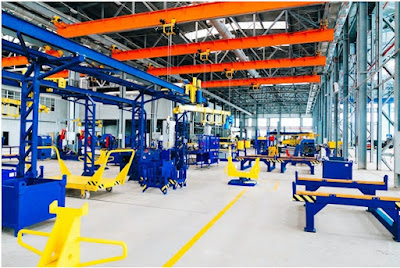Types of Industrial Automation Systems and the Benefits of Implementation
Industrial automation has become an increasingly important part of modern manufacturing processes. Automation helps to reduce costs, increase efficiency and productivity, improve safety, and produce higher-quality products. Automated solutions are used in a variety of industries, from automotive to aerospace, and can be tailored to fit the needs of any manufacturing plant or organization.
This article will discuss some of the different types of industrial automation systems that are commonly used in today’s manufacturing processes. We will also look at the benefits of using automation systems in the workplace. By the end of this post, you should have a better understanding of some of the different types of automation systems and their advantages.
The first type of automation system we will cover is a form of programmable automation called a programmable logic controller (PLC). PLCs are computer-based systems that are designed to control industrial processes. They are programmed with a series of instructions that tell the system how to respond to certain conditions. PLCs are often used to control machines, such as robots, and can be programmed to perform specific tasks. They are also used to monitor and control industrial processes, such as assembly line operations.
Another type of automation system is a robotic system. Robotic systems are computer-controlled machines that can be programmed to perform tasks. These systems are typically used in manufacturing processes to automate repetitive tasks, such as welding and assembly. They can, however, also be used to perform more complex tasks, such as picking and placing components, and reduce the error of human operators in doing so while improving production volumes.
Vision systems represent another type of automation. Vision systems use cameras and computer algorithms to analyze images and detect objects. They are often used in manufacturing processes to inspect parts and detect defects. Vision systems can also be used to guide robots and other industrial machines on a production line.
Another type of automation system is a motion control system. Motion control systems are used to control the movement of machines and robots. They are typically used in manufacturing processes to ensure that machines move in the correct direction and at the right speed.
The last type of automation system we will cover is a process control system. Process control systems are used to monitor and control industrial processes. They are typically used to monitor production parameters, such as temperature, pressure, and flow. Process control systems can also be used to optimize production processes and reduce costs. Poor process controls can cost companies large sums of money every year due to procedural inefficiencies, so both fixed automation and flexible automation can be valuable.
On the Advantages ofImplementing Industrial Automation Systems
1. Increased Efficiency
One of the biggest benefits of using an industrial automation system is that it can increase the efficiency of your operations. Automation systems are designed to automate tedious, repetitive tasks and processes, freeing up time for your staff to focus on more important tasks. This can lead to increased productivity and improved customer service, as well as reduced costs.
2. Improved Quality Control
Another benefit of using an industrial automation system is that it can help to improve quality control. Automation systems are designed to be more accurate and consistent than manual processes, meaning that you can reduce the risk of errors and mistakes. This can help to ensure that your products and services meet the highest standards of quality.
3. Reduced Labor Costs
One of the most attractive benefits of using an industrial automation system is that it can help to reduce labor costs. Automation systems can help to reduce the amount of time and labor needed to complete certain tasks and processes, which can result in reduced labor costs. This can be especially beneficial for businesses that operate on tight budgets.
4. Increased Safety
Using an industrial automation system can also help to improve the safety of your workplace. Automation systems can help to reduce the risk of accidents and injuries by automating certain tasks and processes that can be hazardous for humans to undertake. This can help to ensure that your employees remain safe and healthy while on the job.
5. Increased Flexibility
Finally, using an industrial automation system can help to increase the flexibility of your operations. Automation systems are designed to be easily adapted to changing needs and requirements, meaning that you can quickly and easily adjust your operations to meet the demands of the market. This can help to ensure that your business remains competitive in today’s ever-changing environment.
Quality Industrial Automation System Components
Industrial automation systems are an essential part of modern manufacturing processes. There are a variety of automation systems available, each of which can be tailored to fit the needs of any organization. Automation systems can help to reduce costs, increase efficiency, improve safety, and produce higher-quality products.
If you are considering designing or building an automation systems for your organization, it is important to evaluate your needs and select the automation system that is best suited for your organization. A qualified automation engineer can help you make the right choice and ensure that your system is properly installed and maintained.
We carry a wide range of products and components of automation systems, including but not limited to industrial connectors, electrical enclosures, conduits, cable entry systems, cooling system components, and lights and lighting fixtures. Many of the top brands in the industry, such as CNLINKO, Sealcon, Boxco, and Euri Lighting, are represented.
For more information about our automated system components and accessories, feel free to reach out to us at 800-966-2345.





Comments
Post a Comment